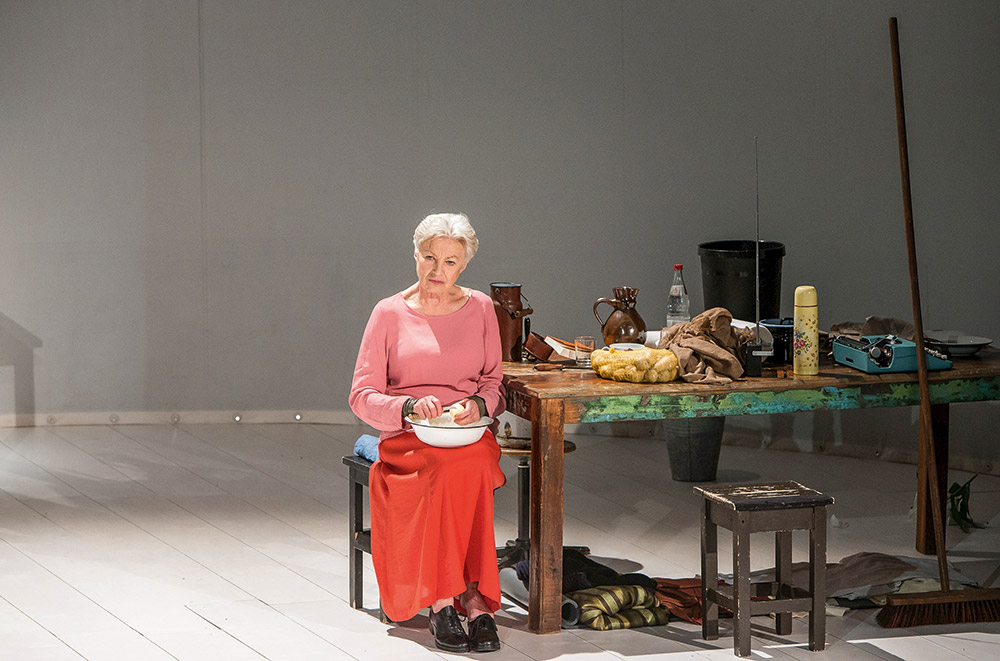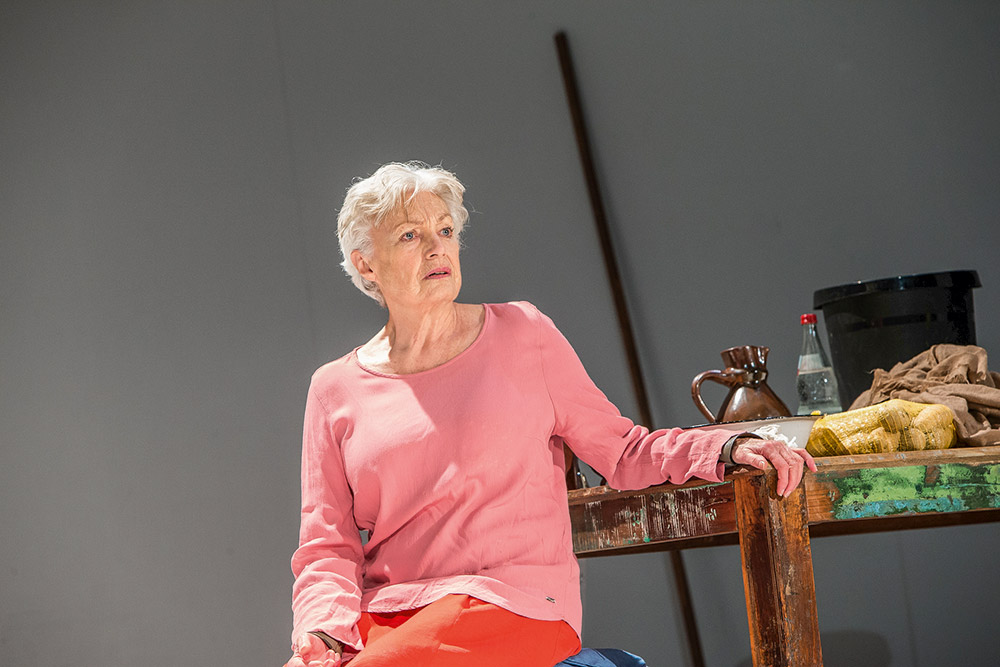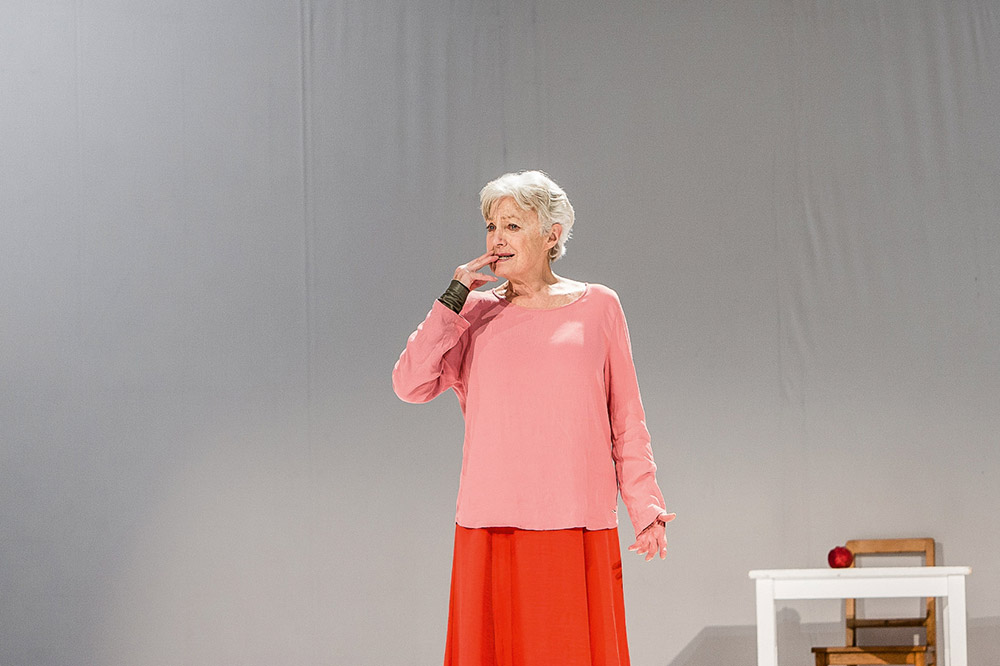After having seen Nicole Heesters’ acclaimed current solo piece Marias Testament by Colm Tóibín at the Theater in der Josefstadt, second-year students in the Lead Voice and Speech course taught by Annett Matzke, Tamara Metelka, and Florian Reiners met for a chat with this character actor and Max Reinhardt Seminar graduate in late November.

Over the 66 years of her career so far, Nicole Heesters has performed at virtually all of the important German-language theatres including the Schauspielhaus in Düsseldorf, the Schauspielhaus in Hamburg, the theatre of the Berliner Ensemble, the Nationaltheater in Mannheim, the Residenztheater in Munich, and the Viennese venues Theater in der Josefstadt and Volkstheater. She’s worked with stage directors including Andrea Breth, Claus Peymann, Peter Zadek, Karl-Heinz Stroux, and Hans Neuenfels, played roles that are central to the dramatic literature, and also acted in numerous cinematic and television productions.
The students had the opportunity to speak with Heesters about how she approached and prepared her current 100-minute monologue, which Elmar Goerden’s production impressively reduces to the art of thinking and speaking—and thus to Heesters’ voice. Marias Testament tells the story of the Mother of God, who was unable to protect her son and save him from his gruesome death, from her very own individual perspective.
Heesters explained her working principle of always studying a text for three full months before rehearsals begin so that it’s completely available to her right from the start. She thus already has a solid basis upon which to work at her first rehearsal—one that can be changed and shifted in consultation with the director during the rehearsal phase, which in this case lasted for four-and-a-half weeks. In doing so, the basic stance of her character is typically expanded upon or enlarged. This modus operandi eases her post-rehearsal work, since she has no need to memorise any text when she’s done rehearsing in the evening and can work far more freely.

In the discussion, the students zeroed in on topics from the main artistic subject of Lead Voice and Speech (including work with mental images and the discovery of one’s own personal connection to the text), and they found it striking just how timeless the practice of applying one’s speaking skills is. Heesters stressed how mastery of the material covered in speech instruction is an important foundation that one needs in order to convey feelings such as rage, fear, or joy. She also described how quite often, as she goes, over a text again and again, she hits upon a sentence that’s special to her, one that then becomes the starting point for her further work on that particular text.
In the rehearsals for Marias Testament, she sought out the humour—and, even more importantly, the currently relevant aspects—of the material to be found in the text. In approaching texts, Heesters always starts from society’s present-day situation. So in this case, she refrained from seeking out the tie-ins to the Bible, instead using interviews with mothers whose sons had fallen prey to radicalisation as her working material. She stressed the enormous importance of such current relevance in stage work.
One central question posed by the students was about just how one hits upon that single idea that motivates the thoughts in a text and of a character, a discovery that leads to authentic speech in the character and the overall work. Heesters explained how that’s something one always has to go off in search of, and her advice was to seek out the direct and the real—real stories, like on the tram or in the newspaper—because these lead to authenticity.
Heesters stressed that one should always act as one is and refrain from self-falsification, with this being the sole way to allow a role to grow. And in the same spirit, she passionately urged the students to give everything of themselves in their respective roles, to go all-in. She added that she’d learned a great deal about this from the directors Peter Zadek and Klaus Michael Grüber—but that it’s above all a matter of experience and practice. And in terms of this approach, she said that her work with Andrea Breth had also been quite a fortunate occurrence. But she reminded the students that no matter who is directing, work on the text itself is always something that has to be done on one’s own. Because it’s only then that working together with a director represents an opportunity for growth.

She additionally pointed out that students can also learn a great deal from observation, for which reason it’s important to attend theatrical performances. And on this, she quoted Humphrey Bogart, who’s said to have once stated that he “wouldn’t be caught dead acting.”
Present-day theatre’s changing reality was also a topic. New here, said Heesters, is how there’s often no post-rehearsal conversation on the work just done together.
It used to be that those involved would have heated discussions about the play and then continue working, but the profession has become quite a solo affair these days—and she considers it highly unfortunate how there’s no longer sufficient conversation among colleagues about the works being rehearsed. She went on to note that this is one of the few professions in which one can age freely—though the work gets no easier and one’s responsibility grows, with the necessity of being authentic ever present. And she stated that she doesn’t want to simply play, but rather to constantly search for that point where it’s simply right.
Heesters was admitted to the Max Reinhardt Seminar when she was only 16. She’s now been acting for 66 years—and with every role, she sets out on a new search. She is convinced that one repeatedly starts over from the beginning, from zero—perhaps from somewhere else than before, but still from zero. And that one needs to love this job fiercely and work on it one’s entire life long. And she emphasised how, later on, things won’t be like they are now at the Seminar—because here, students still have observant guidance. Heesters herself is extremely fond of thinking back to her time here: it was so free, she says, with guidance and care, and everyone provided support when needed.
She concluded the discussion with a bit of advice for the Max Reinhard Seminar students: to really take advantage of their time here, to seize upon what their teachers have to offer, and to work hard and tackle things right now. And last but not least, Heesters stated that she could understand why everyone wants to be an actor—for it’s a wonderful job.
Impressions of the students
“Her spirit impressed me. This wasn’t an 82-year-old woman! Max Reinhardt’s saying, ‘Put your childhood in your pocket and run away because that’s everything you have,’ totally makes sense when you’ve experienced her. Her will to live, with so much curiosity to try out new things again and again, and this willingness to start totally afresh and never just think, ‘I know how’.”
Wiebke Yervis
“I thought it was really wonderful how she talked about life at the theatre and told stories from way back then. How things were in the cafeteria, with the manager there discussing the plays with them. And her continued passion, which is about more than just whether a performance was good. How it’s about life and about survival, as well.”
Leonhard Hugger
“I thought it was really cool that she talked with us about her personal way of approaching a text. And the fact that she starts with memorisation months prior and knows her lines inside and out before rehearsals even start, plus how she continues working on the text when performances are already running and doesn’t just repeat the final product presented at the première … this all means that her work is really never done, and I thought that was important, something we need to be reminded of again and again.”
Elias Kirschgens

